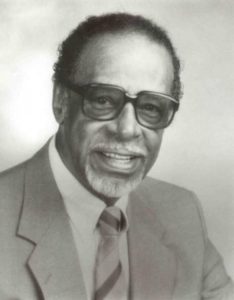
Cholly Atkins
Cholly Atkins was born on this date in 1913. He was a Black choreographer and dancer.
Born Charles Atkinson in Pratt City, AL, Atkins learned to dance from his mother. After winning a Charleston dance contest in Buffalo, N.Y., in 1923, Atkins became a singing waiter. Soon, he teamed up with William Porter in a tap act called the Rhythm Pals. They broke up in the late 1930s, after which Atkins took the name Cholly, similar to a news columnist of the day.
He worked several dancing jobs, including "The Hot Mikado" at the 1939 World's Fair. He divorced his first wife, Catherine. He danced with Dottie Saulters (whom he later married) with several major bands of the era.
In 1946, after serving in the Army, he and Charles "Honi" Coles got together for a memorable partnership. British dance critic Edward Thorpe describes Coles and Atkins as “the ultimate example of what other protagonists of American vernacular dance call ‘a class act,’ and there can be no higher praise than that.”
He danced on Broadway in "Gentlemen Prefer Blondes," performances in Las Vegas, guest shots in forgettable movies, and showcases with major jazz and swing bands, including those led by Louis Armstrong, Charlie Barnet, Count Basie, Cab Calloway, and Lionel Hampton.
His 1944 marriage to Dorothy Lee ended in divorce in 1962. The following year, he married Maye Harrison Anderson. As the popularity of tap lessened, Atkins began to take jobs staging the performances of popular vocal groups. Sammy Strain of the O’Jays told the Washington Post that Atkins’ steps were “so simple, little pivots and stuff, but so hard I’d have nightmares over them.”
Later, he achieved his greatest fame as a choreographer for Motown's leading singing groups. He went to Detroit in 1965 and remained there until 1971, where he made an unforgettable impact on the careers of the Supremes, the Temptations, Gladys Knight and the Pips, Smokey Robinson and the Miracles, Aretha Franklin, Marvin Gaye, and others.
Atkins continued to stage nightclub acts in Las Vegas, leaving for occasional projects, such as the 1988 Broadway tap-revival musical 'Black and Blue,' for which he won a Tony Award.
He also accepted a 1993 National Endowment for the Arts three-year fellowship to tour colleges and universities, teaching vocal choreography as a complete dance idiom. Cholly Atkins died in May 2003 at the age of 89.